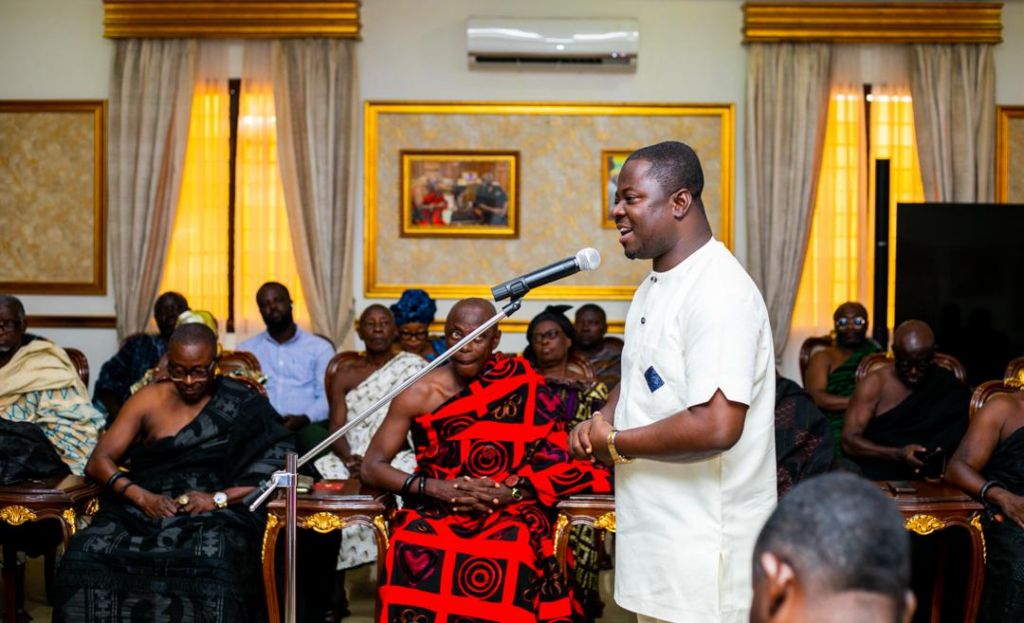The Okyehene, Osagyefuo Ofori Panin has urged the management of the Youth Employment Agency (YEA) led by its Chief Executive Officer (CEO) Kofi Baah Agyepong to give hope to the Ghanaian youth with the projects the Agency is undertaking.
Speaking during a courtesy call on him, Osagyefuo Ofori Panin elaborated on the importance of Agriculture to the growth of the nation and noted that, the YEA has the responsibility to engage the youth in productive ventures in agriculture especially, for them to turn the fortunes of the country around for the better.

According to him, over one billion people, two-thirds of them women and children, live in extreme poverty of less than one dollar a day and over 60% of the adult population in Sub-Saharan Africa is engaged in Subsistence agriculture with reliance on rainfall, due to the absence of irrigation.
In essence, he averred that there is no all-year-round employment leading to mass rural poverty and unemployment.
He mentioned that the Youth In Agriculture module by the YEA has come at an opportune time to close that gap and create wealth for the youth.
Okyehene urged the YEA CEO to help build and develop the youth in agriculture, assist them with technical, logistical and financial support and guide them to make good use of the land.

He said the importance of Agriculture cannot be overemphasised.
The Okyenhene, Osagyefuo Amoatia Ofori Panin, however, called for a paradigm shift from commercial monoculture agriculture to sustainable organic farming to protect human health and the planet.
He said, boosting productivity, fostering competitiveness and ensuring that small-scale farmers have greater access to markets are key to West Africa realising its full agricultural potential.
He urged the YEA and government to significantly invest in policy support that targets broader agricultural development and greater coordination among producers, private industry and the public and financial sectors.
According to him, although much is being done, more needs to be done in terms of basic infrastructure, investments, research and development and agricultural processing, stressing that farmers in Ghana have little incentive to increase production if they can’t sell their crops because of cheaper and easily accessible imports, whilst policy and market incentives are needed to improve the competitiveness of locally grown crops and increase their share in the consumer market.

“They need specific support to improve access to labour-reducing equipment and credit for post-harvest processing and marketing, and to strengthen their technical and organizational capacity,” he told YEA.
On his part, the Chief Executive Officer (CEO) of the Youth Employment Agency (YEA), Kofi Baah Agyepong, said the Youth In Agriculture project is designed to support the youthful population to go into agriculture as stress-free as possible.
He said this initiative would not only redefine agriculture in the country but also offer jobs to several Ghanaian youth.
The project is targeted at 200,000 youth with one million acres of land available. Each person will be allocated five acres of land for crop farming.

He averred that government intends to train and equip some 60,000 youth as part of its Planting for Food and Jobs programme, and that there is the need for traditional leaders to support the YEA with parcels of land to make this project a success.
Kofi Baah Agyepong took the opportunity to appeal for land from the Okyehene for the project in the region.
According to him, he was aware of some discussions between the Okyehene and his predecessor over parcels of land for the project; and acting in his capacity as the CEO of YEA, he deemed it prudent to pursue that discussion and ensure that the Youth In Agriculture Project is successful for majority of Ghanaian youth to benefit.
He also indicated that the Youth in Agriculture project has four components namely; Crops/Block Farm, Livestock and Poultry, Fisheries/Aquaculture, and Agribusiness.
Latest Stories
-
EIU optimistic Ghana’s debt-carrying capacity could easily improve in future
7 mins -
Access Bank Ghana Plc records commendable financial growth in quarter one, 2024
2 hours -
GFA DC charges Bashir Hayford over alleged misconduct in Bechem Utd game
3 hours -
MTN FA Cup: Dreams FC beat Soccer Intellectuals to make semis
3 hours -
Ayorkor Botchwey champions transformative investment, trade agenda
4 hours -
KNUST, University of Rwanda share experiences in implementation of Mastercard Foundation Scholars Program
4 hours -
Top 10 most visited tourist sites in Ghana 2023
4 hours -
Cecilia Dapaah case: I will reopen investigation into alleged acts of corruption – Mahama
4 hours -
GRA boss charges customs officers to be professional ahead of 2024 general elections
5 hours -
NPP thanks stakeholders for successful Ejisu by-election
5 hours -
Bawumia promises to involve chiefs in licensing miners if elected President
5 hours -
Koda should have visited the pastor to avert the prophecy – Ajagurajah
5 hours -
Emotional support alligator taken and released in swamp
5 hours -
A mate is a mate, Bawumia can’t be in the driver’s seat – NDC Communicator
5 hours -
Over 400 million Google accounts have used passkeys, but our passwordless future remains elusive
5 hours

